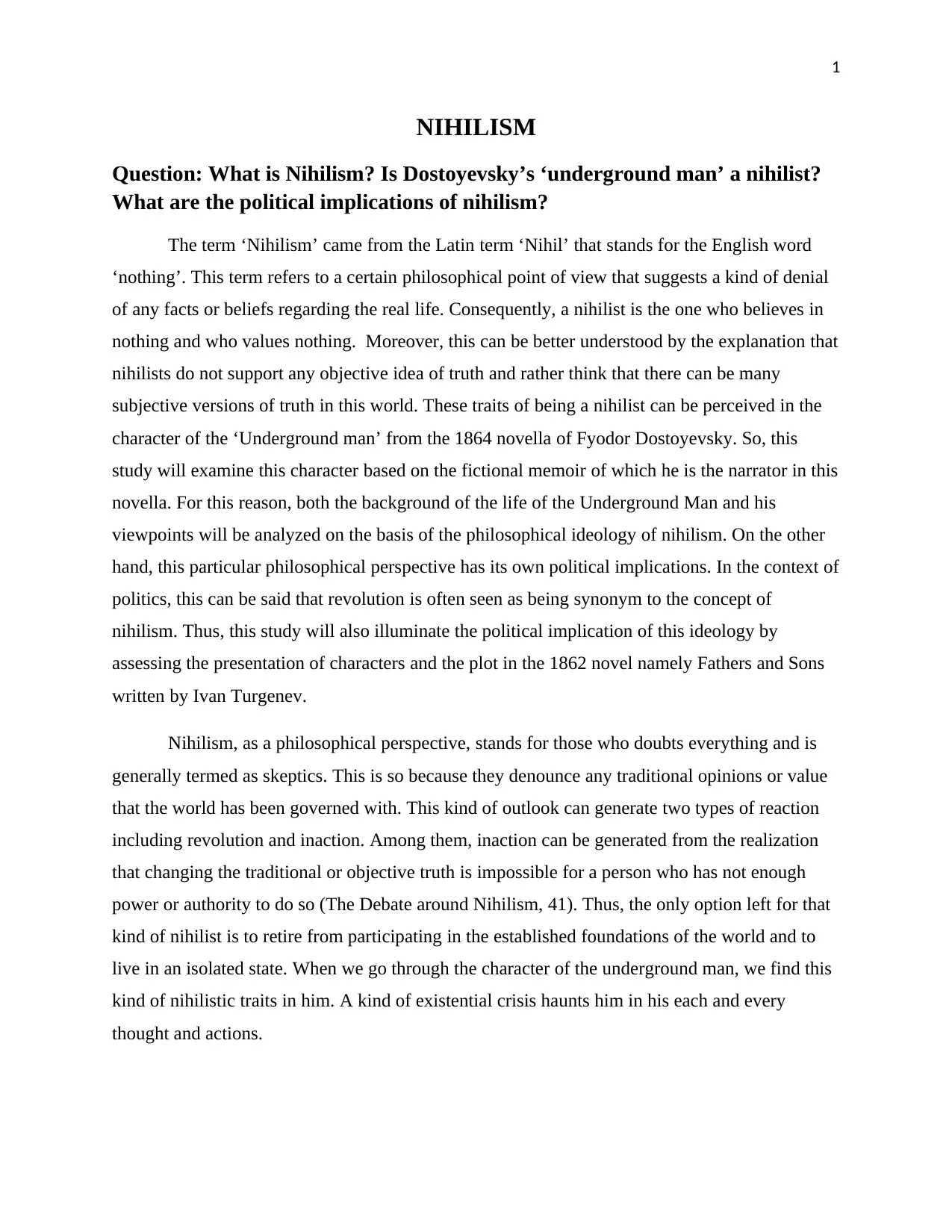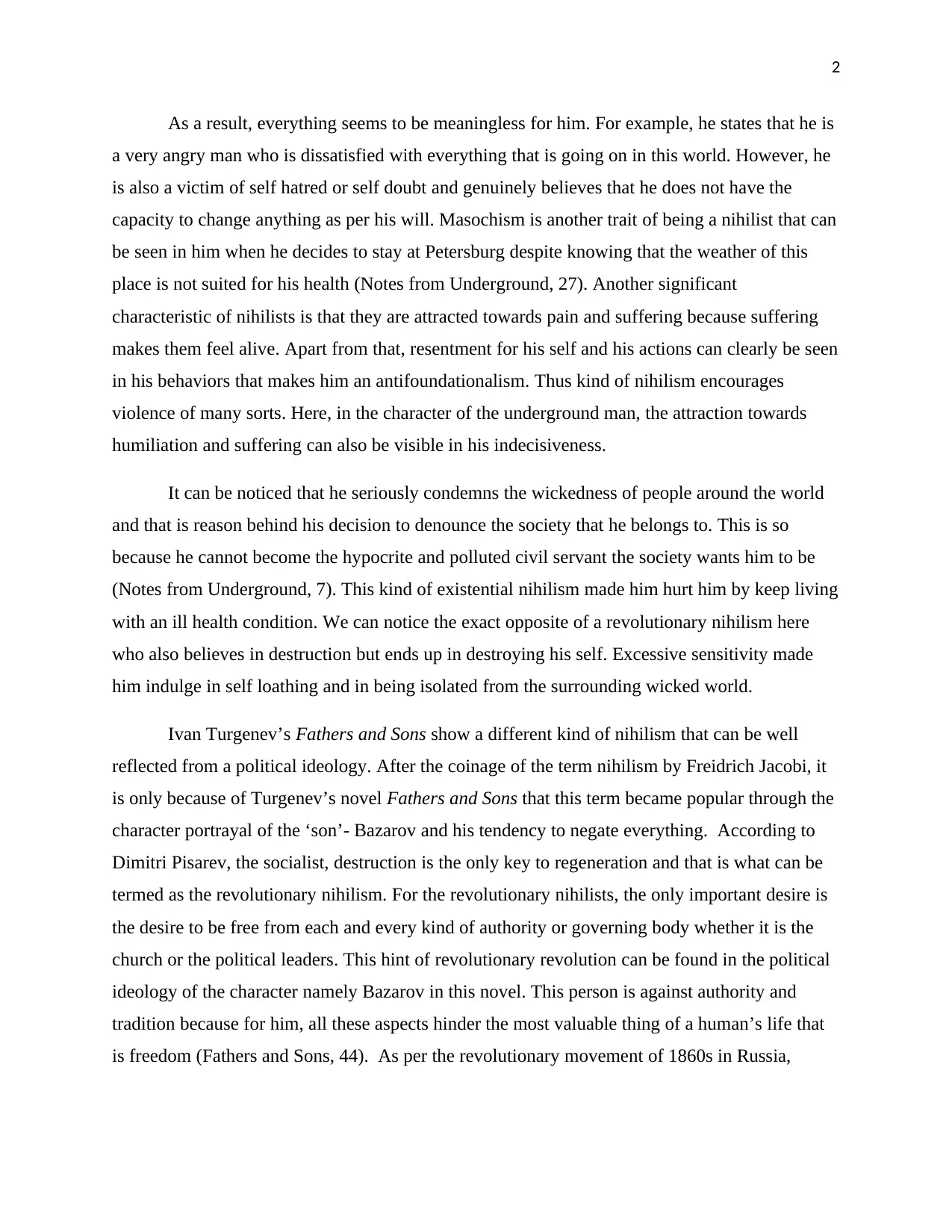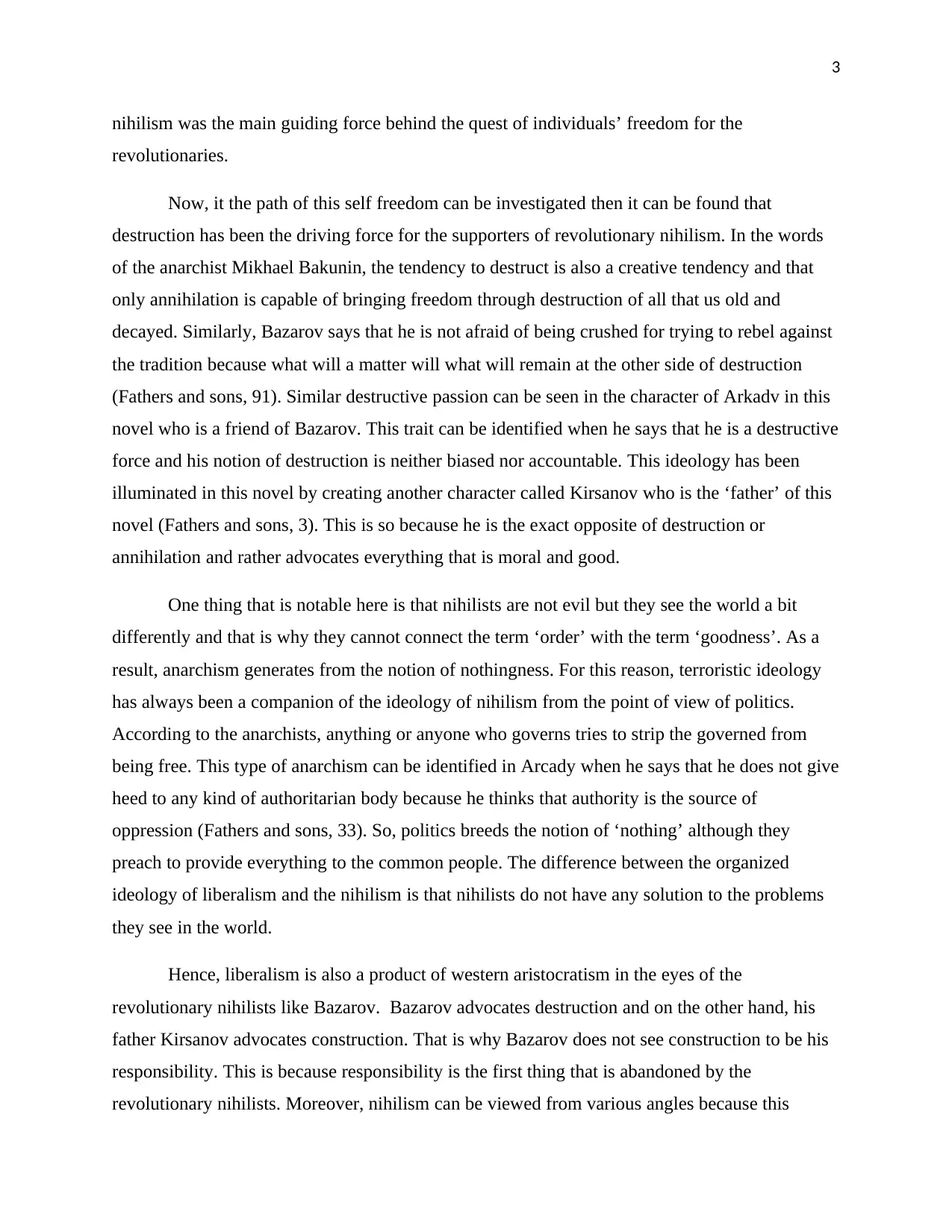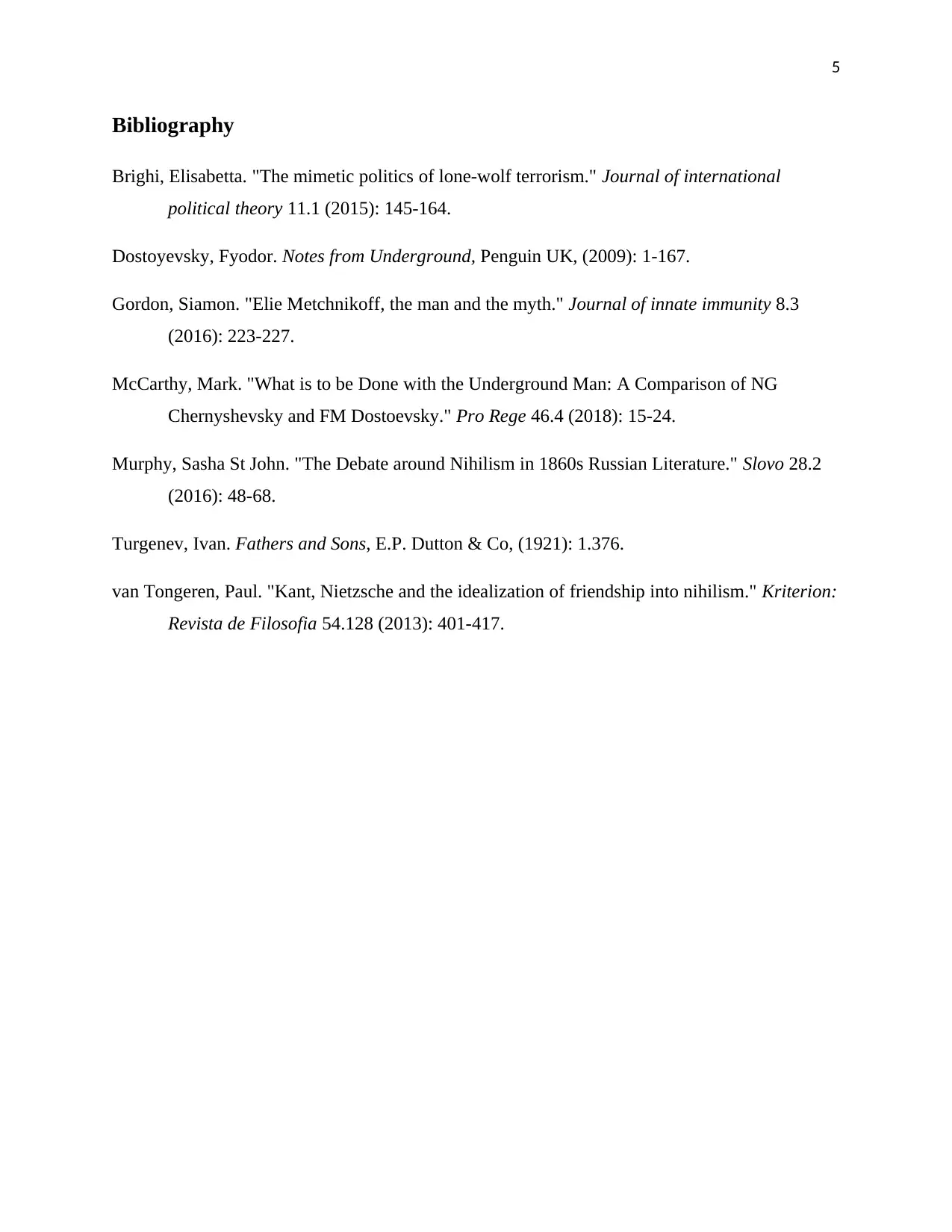Nihilism: Definition, Underground Man, and Political Implications
VerifiedAdded on 2023/04/07
|5
|1427
|262
AI Summary
This study examines the concept of nihilism, focusing on its portrayal in Fyodor Dostoyevsky's 'Underground Man' and its political implications. Nihilism is a philosophical perspective that denies objective truth and values, leading to revolution or inaction. The character of the Underground Man embodies nihilistic traits, such as existential crisis and attraction to suffering. Ivan Turgenev's novel 'Fathers and Sons' also explores nihilism, particularly through the character of Bazarov and his revolutionary ideology. Nihilism is closely linked to anarchism and the rejection of authority. This study delves into the philosophical and political aspects of nihilism.
Contribute Materials
Your contribution can guide someone’s learning journey. Share your
documents today.

1
NIHILISM
Question: What is Nihilism? Is Dostoyevsky’s ‘underground man’ a nihilist?
What are the political implications of nihilism?
The term ‘Nihilism’ came from the Latin term ‘Nihil’ that stands for the English word
‘nothing’. This term refers to a certain philosophical point of view that suggests a kind of denial
of any facts or beliefs regarding the real life. Consequently, a nihilist is the one who believes in
nothing and who values nothing. Moreover, this can be better understood by the explanation that
nihilists do not support any objective idea of truth and rather think that there can be many
subjective versions of truth in this world. These traits of being a nihilist can be perceived in the
character of the ‘Underground man’ from the 1864 novella of Fyodor Dostoyevsky. So, this
study will examine this character based on the fictional memoir of which he is the narrator in this
novella. For this reason, both the background of the life of the Underground Man and his
viewpoints will be analyzed on the basis of the philosophical ideology of nihilism. On the other
hand, this particular philosophical perspective has its own political implications. In the context of
politics, this can be said that revolution is often seen as being synonym to the concept of
nihilism. Thus, this study will also illuminate the political implication of this ideology by
assessing the presentation of characters and the plot in the 1862 novel namely Fathers and Sons
written by Ivan Turgenev.
Nihilism, as a philosophical perspective, stands for those who doubts everything and is
generally termed as skeptics. This is so because they denounce any traditional opinions or value
that the world has been governed with. This kind of outlook can generate two types of reaction
including revolution and inaction. Among them, inaction can be generated from the realization
that changing the traditional or objective truth is impossible for a person who has not enough
power or authority to do so (The Debate around Nihilism, 41). Thus, the only option left for that
kind of nihilist is to retire from participating in the established foundations of the world and to
live in an isolated state. When we go through the character of the underground man, we find this
kind of nihilistic traits in him. A kind of existential crisis haunts him in his each and every
thought and actions.
NIHILISM
Question: What is Nihilism? Is Dostoyevsky’s ‘underground man’ a nihilist?
What are the political implications of nihilism?
The term ‘Nihilism’ came from the Latin term ‘Nihil’ that stands for the English word
‘nothing’. This term refers to a certain philosophical point of view that suggests a kind of denial
of any facts or beliefs regarding the real life. Consequently, a nihilist is the one who believes in
nothing and who values nothing. Moreover, this can be better understood by the explanation that
nihilists do not support any objective idea of truth and rather think that there can be many
subjective versions of truth in this world. These traits of being a nihilist can be perceived in the
character of the ‘Underground man’ from the 1864 novella of Fyodor Dostoyevsky. So, this
study will examine this character based on the fictional memoir of which he is the narrator in this
novella. For this reason, both the background of the life of the Underground Man and his
viewpoints will be analyzed on the basis of the philosophical ideology of nihilism. On the other
hand, this particular philosophical perspective has its own political implications. In the context of
politics, this can be said that revolution is often seen as being synonym to the concept of
nihilism. Thus, this study will also illuminate the political implication of this ideology by
assessing the presentation of characters and the plot in the 1862 novel namely Fathers and Sons
written by Ivan Turgenev.
Nihilism, as a philosophical perspective, stands for those who doubts everything and is
generally termed as skeptics. This is so because they denounce any traditional opinions or value
that the world has been governed with. This kind of outlook can generate two types of reaction
including revolution and inaction. Among them, inaction can be generated from the realization
that changing the traditional or objective truth is impossible for a person who has not enough
power or authority to do so (The Debate around Nihilism, 41). Thus, the only option left for that
kind of nihilist is to retire from participating in the established foundations of the world and to
live in an isolated state. When we go through the character of the underground man, we find this
kind of nihilistic traits in him. A kind of existential crisis haunts him in his each and every
thought and actions.
Secure Best Marks with AI Grader
Need help grading? Try our AI Grader for instant feedback on your assignments.

2
As a result, everything seems to be meaningless for him. For example, he states that he is
a very angry man who is dissatisfied with everything that is going on in this world. However, he
is also a victim of self hatred or self doubt and genuinely believes that he does not have the
capacity to change anything as per his will. Masochism is another trait of being a nihilist that can
be seen in him when he decides to stay at Petersburg despite knowing that the weather of this
place is not suited for his health (Notes from Underground, 27). Another significant
characteristic of nihilists is that they are attracted towards pain and suffering because suffering
makes them feel alive. Apart from that, resentment for his self and his actions can clearly be seen
in his behaviors that makes him an antifoundationalism. Thus kind of nihilism encourages
violence of many sorts. Here, in the character of the underground man, the attraction towards
humiliation and suffering can also be visible in his indecisiveness.
It can be noticed that he seriously condemns the wickedness of people around the world
and that is reason behind his decision to denounce the society that he belongs to. This is so
because he cannot become the hypocrite and polluted civil servant the society wants him to be
(Notes from Underground, 7). This kind of existential nihilism made him hurt him by keep living
with an ill health condition. We can notice the exact opposite of a revolutionary nihilism here
who also believes in destruction but ends up in destroying his self. Excessive sensitivity made
him indulge in self loathing and in being isolated from the surrounding wicked world.
Ivan Turgenev’s Fathers and Sons show a different kind of nihilism that can be well
reflected from a political ideology. After the coinage of the term nihilism by Freidrich Jacobi, it
is only because of Turgenev’s novel Fathers and Sons that this term became popular through the
character portrayal of the ‘son’- Bazarov and his tendency to negate everything. According to
Dimitri Pisarev, the socialist, destruction is the only key to regeneration and that is what can be
termed as the revolutionary nihilism. For the revolutionary nihilists, the only important desire is
the desire to be free from each and every kind of authority or governing body whether it is the
church or the political leaders. This hint of revolutionary revolution can be found in the political
ideology of the character namely Bazarov in this novel. This person is against authority and
tradition because for him, all these aspects hinder the most valuable thing of a human’s life that
is freedom (Fathers and Sons, 44). As per the revolutionary movement of 1860s in Russia,
As a result, everything seems to be meaningless for him. For example, he states that he is
a very angry man who is dissatisfied with everything that is going on in this world. However, he
is also a victim of self hatred or self doubt and genuinely believes that he does not have the
capacity to change anything as per his will. Masochism is another trait of being a nihilist that can
be seen in him when he decides to stay at Petersburg despite knowing that the weather of this
place is not suited for his health (Notes from Underground, 27). Another significant
characteristic of nihilists is that they are attracted towards pain and suffering because suffering
makes them feel alive. Apart from that, resentment for his self and his actions can clearly be seen
in his behaviors that makes him an antifoundationalism. Thus kind of nihilism encourages
violence of many sorts. Here, in the character of the underground man, the attraction towards
humiliation and suffering can also be visible in his indecisiveness.
It can be noticed that he seriously condemns the wickedness of people around the world
and that is reason behind his decision to denounce the society that he belongs to. This is so
because he cannot become the hypocrite and polluted civil servant the society wants him to be
(Notes from Underground, 7). This kind of existential nihilism made him hurt him by keep living
with an ill health condition. We can notice the exact opposite of a revolutionary nihilism here
who also believes in destruction but ends up in destroying his self. Excessive sensitivity made
him indulge in self loathing and in being isolated from the surrounding wicked world.
Ivan Turgenev’s Fathers and Sons show a different kind of nihilism that can be well
reflected from a political ideology. After the coinage of the term nihilism by Freidrich Jacobi, it
is only because of Turgenev’s novel Fathers and Sons that this term became popular through the
character portrayal of the ‘son’- Bazarov and his tendency to negate everything. According to
Dimitri Pisarev, the socialist, destruction is the only key to regeneration and that is what can be
termed as the revolutionary nihilism. For the revolutionary nihilists, the only important desire is
the desire to be free from each and every kind of authority or governing body whether it is the
church or the political leaders. This hint of revolutionary revolution can be found in the political
ideology of the character namely Bazarov in this novel. This person is against authority and
tradition because for him, all these aspects hinder the most valuable thing of a human’s life that
is freedom (Fathers and Sons, 44). As per the revolutionary movement of 1860s in Russia,

3
nihilism was the main guiding force behind the quest of individuals’ freedom for the
revolutionaries.
Now, it the path of this self freedom can be investigated then it can be found that
destruction has been the driving force for the supporters of revolutionary nihilism. In the words
of the anarchist Mikhael Bakunin, the tendency to destruct is also a creative tendency and that
only annihilation is capable of bringing freedom through destruction of all that us old and
decayed. Similarly, Bazarov says that he is not afraid of being crushed for trying to rebel against
the tradition because what will a matter will what will remain at the other side of destruction
(Fathers and sons, 91). Similar destructive passion can be seen in the character of Arkadv in this
novel who is a friend of Bazarov. This trait can be identified when he says that he is a destructive
force and his notion of destruction is neither biased nor accountable. This ideology has been
illuminated in this novel by creating another character called Kirsanov who is the ‘father’ of this
novel (Fathers and sons, 3). This is so because he is the exact opposite of destruction or
annihilation and rather advocates everything that is moral and good.
One thing that is notable here is that nihilists are not evil but they see the world a bit
differently and that is why they cannot connect the term ‘order’ with the term ‘goodness’. As a
result, anarchism generates from the notion of nothingness. For this reason, terroristic ideology
has always been a companion of the ideology of nihilism from the point of view of politics.
According to the anarchists, anything or anyone who governs tries to strip the governed from
being free. This type of anarchism can be identified in Arcady when he says that he does not give
heed to any kind of authoritarian body because he thinks that authority is the source of
oppression (Fathers and sons, 33). So, politics breeds the notion of ‘nothing’ although they
preach to provide everything to the common people. The difference between the organized
ideology of liberalism and the nihilism is that nihilists do not have any solution to the problems
they see in the world.
Hence, liberalism is also a product of western aristocratism in the eyes of the
revolutionary nihilists like Bazarov. Bazarov advocates destruction and on the other hand, his
father Kirsanov advocates construction. That is why Bazarov does not see construction to be his
responsibility. This is because responsibility is the first thing that is abandoned by the
revolutionary nihilists. Moreover, nihilism can be viewed from various angles because this
nihilism was the main guiding force behind the quest of individuals’ freedom for the
revolutionaries.
Now, it the path of this self freedom can be investigated then it can be found that
destruction has been the driving force for the supporters of revolutionary nihilism. In the words
of the anarchist Mikhael Bakunin, the tendency to destruct is also a creative tendency and that
only annihilation is capable of bringing freedom through destruction of all that us old and
decayed. Similarly, Bazarov says that he is not afraid of being crushed for trying to rebel against
the tradition because what will a matter will what will remain at the other side of destruction
(Fathers and sons, 91). Similar destructive passion can be seen in the character of Arkadv in this
novel who is a friend of Bazarov. This trait can be identified when he says that he is a destructive
force and his notion of destruction is neither biased nor accountable. This ideology has been
illuminated in this novel by creating another character called Kirsanov who is the ‘father’ of this
novel (Fathers and sons, 3). This is so because he is the exact opposite of destruction or
annihilation and rather advocates everything that is moral and good.
One thing that is notable here is that nihilists are not evil but they see the world a bit
differently and that is why they cannot connect the term ‘order’ with the term ‘goodness’. As a
result, anarchism generates from the notion of nothingness. For this reason, terroristic ideology
has always been a companion of the ideology of nihilism from the point of view of politics.
According to the anarchists, anything or anyone who governs tries to strip the governed from
being free. This type of anarchism can be identified in Arcady when he says that he does not give
heed to any kind of authoritarian body because he thinks that authority is the source of
oppression (Fathers and sons, 33). So, politics breeds the notion of ‘nothing’ although they
preach to provide everything to the common people. The difference between the organized
ideology of liberalism and the nihilism is that nihilists do not have any solution to the problems
they see in the world.
Hence, liberalism is also a product of western aristocratism in the eyes of the
revolutionary nihilists like Bazarov. Bazarov advocates destruction and on the other hand, his
father Kirsanov advocates construction. That is why Bazarov does not see construction to be his
responsibility. This is because responsibility is the first thing that is abandoned by the
revolutionary nihilists. Moreover, nihilism can be viewed from various angles because this

4
ideology of nothingness can be perceived in anyone who is the forbearer of either conscious
inaction or destruction.
ideology of nothingness can be perceived in anyone who is the forbearer of either conscious
inaction or destruction.
Secure Best Marks with AI Grader
Need help grading? Try our AI Grader for instant feedback on your assignments.

5
Bibliography
Brighi, Elisabetta. "The mimetic politics of lone-wolf terrorism." Journal of international
political theory 11.1 (2015): 145-164.
Dostoyevsky, Fyodor. Notes from Underground, Penguin UK, (2009): 1-167.
Gordon, Siamon. "Elie Metchnikoff, the man and the myth." Journal of innate immunity 8.3
(2016): 223-227.
McCarthy, Mark. "What is to be Done with the Underground Man: A Comparison of NG
Chernyshevsky and FM Dostoevsky." Pro Rege 46.4 (2018): 15-24.
Murphy, Sasha St John. "The Debate around Nihilism in 1860s Russian Literature." Slovo 28.2
(2016): 48-68.
Turgenev, Ivan. Fathers and Sons, E.P. Dutton & Co, (1921): 1.376.
van Tongeren, Paul. "Kant, Nietzsche and the idealization of friendship into nihilism." Kriterion:
Revista de Filosofia 54.128 (2013): 401-417.
Bibliography
Brighi, Elisabetta. "The mimetic politics of lone-wolf terrorism." Journal of international
political theory 11.1 (2015): 145-164.
Dostoyevsky, Fyodor. Notes from Underground, Penguin UK, (2009): 1-167.
Gordon, Siamon. "Elie Metchnikoff, the man and the myth." Journal of innate immunity 8.3
(2016): 223-227.
McCarthy, Mark. "What is to be Done with the Underground Man: A Comparison of NG
Chernyshevsky and FM Dostoevsky." Pro Rege 46.4 (2018): 15-24.
Murphy, Sasha St John. "The Debate around Nihilism in 1860s Russian Literature." Slovo 28.2
(2016): 48-68.
Turgenev, Ivan. Fathers and Sons, E.P. Dutton & Co, (1921): 1.376.
van Tongeren, Paul. "Kant, Nietzsche and the idealization of friendship into nihilism." Kriterion:
Revista de Filosofia 54.128 (2013): 401-417.
1 out of 5
Your All-in-One AI-Powered Toolkit for Academic Success.
+13062052269
info@desklib.com
Available 24*7 on WhatsApp / Email
![[object Object]](/_next/static/media/star-bottom.7253800d.svg)
Unlock your academic potential
© 2024 | Zucol Services PVT LTD | All rights reserved.

